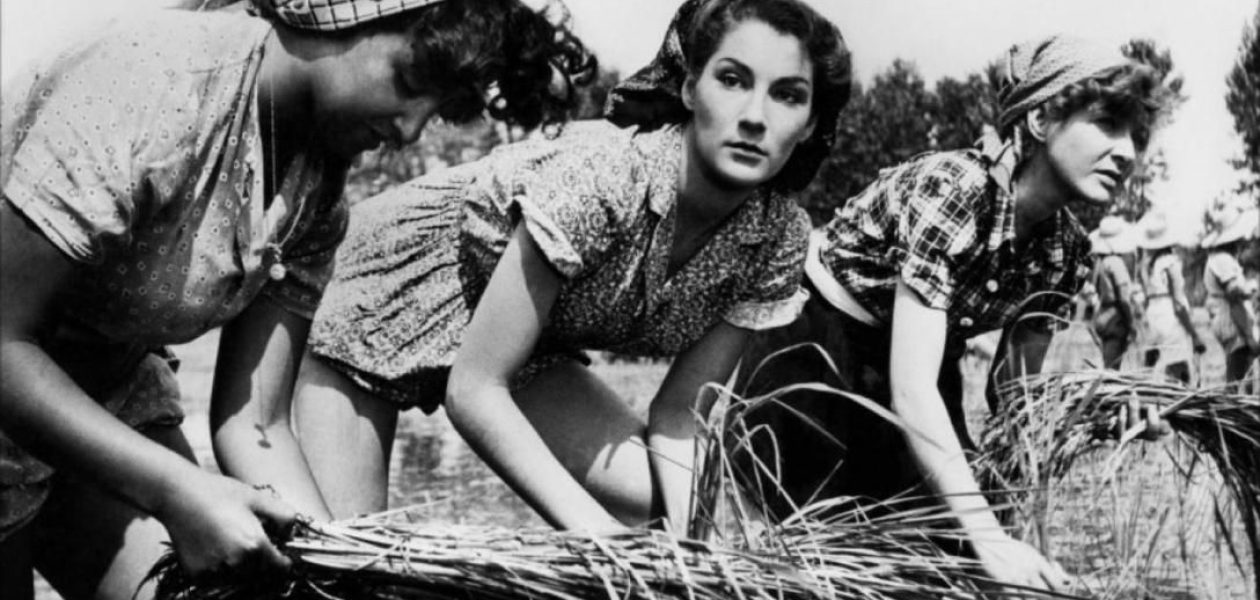RISO AMARO (Bitter rice / Italy, 1949, 108′)
Saturday October 7th, 10 a.m, Cinema Centrale Arthouse
Event in collaboration with Cinema Centrale Arthouse
The Long March
The collaboration with Cinema Centrale Arthouse continues this year to present to the public cinema about labor issues from years past, with a focus on movies made in Italy and on topics that are always topical.
On October 7th at 10 a.m. at cinema Centrale, the great classic in the history of Italian cinema Riso Amaro by Giuseppe De Santis (Italy, 1949) will be presented. The movie explores the reality of the Mondine through the story of a couple of thieves on the run and a criminal and sentimental plot that ends in tragedy. Its numerous actors include Silvana Mangano, Vittorio Gassman and Raf Vallone.
Gaetano Renda will present the film. Giorgio Simonelli (cinema and television scholar) will intervene.
Admission mode: free entrance.
Direction: Giuseppe De Santis
Screenplay: Corrado Alvaro, Giuseppe De Santis, Carlo Lizzani, Carlo Musso, Ivo Perilli, Gianni Puccini
Photography: Otello Martelli
Editing: Gabriele Varriale
Music: Goffredo Petrassi
Actors: Silvana Mangano, Vittorio Gassman, Raf Vallone, Doris Dowling, Checco Rissone, Nico Pepe, Adriana Sivieri, Lia Corelli, Carlo Mazzarella
Production: Lux Film
On the run from the police after stealing a customer’s necklace at the instigation of her lover Walter, Francesca, a young hotel maid, boards a train full of rice-workers heading from Turin to the Vercelli rice fields and joins them. Silvana, a mondina veteran of the rice planting season, steals the necklace from her. At the workplace Walter reaches Francesca and seduces Silvana. When he discovers that the necklace is fake, he decides to steal the rice stored in the warehouse. Tension grows and tragedy looms.
Giuseppe De Santis (Fondi, Italy, 1917 – Rome, Italy, 1997), director, screenwriter and actor, he studied philosophy at the University of Rome. At the beginning of the 1940s he entered the world of cinema attending the group of the magazine “Cinema” with the directors Carlo Lizzani and Michelangelo Antonioni. In 1942In 1942, after attending courses at the Centro Sperimentale di Cinematografia, he shot his first short film, La gatta. He collaborated with Luchino Visconti (Ossessione, 1943) and Roberto Rossellini (Desiderio, 1945). He directed an episode of Giorni di gloria (Days of Glory, 1945), the first documentary on the German occupation of Rome and the Italian Resistance. In 1946 he made his feature film debut with Caccia tragica (Tragic Hunt), launching an auteur poetics that intertwined neorealism and genre cinema. After Riso Amaro, which launched newcomer Silvana Mangano, he signed other masterpieces of that new Italian cinema, drawing attention to himself for his innovative approach in dealing with highly topical issues. The 1950s were a golden decade for De Santis, while in the 1960s his activity began to thin out. His last film dates back to 1972, the conjugal drama Un apprezzato professionista di sicuro avvenire, while two years before his death he received the Golden Lion for Lifetime Achievement and made the medium-length film Oggi è un altro giorno with Bruno Bigoni, an unconventional reflection on anti fascist fifty years after the Liberation.
Filmography: La gatta (cm, 1942), Giorni di gloria (un episodio, doc., 1945), Caccia tragica (1946), Riso amaro (1949), Non c’è pace tra gli ulivi (1950), Roma ore 11 (1952), Un marito per Anna Zaccheo (1953), Giorni d?amore (1954), Uomini e lupi (1956), La strada lunga un anno (1958), La garçonnière (1960), Italiani brava gente (1964), Un apprezzato professionista di sicuro avvenire (1972), Oggi è un altro giorno (Milano 1945-1995) (mm, doc., 1995).


